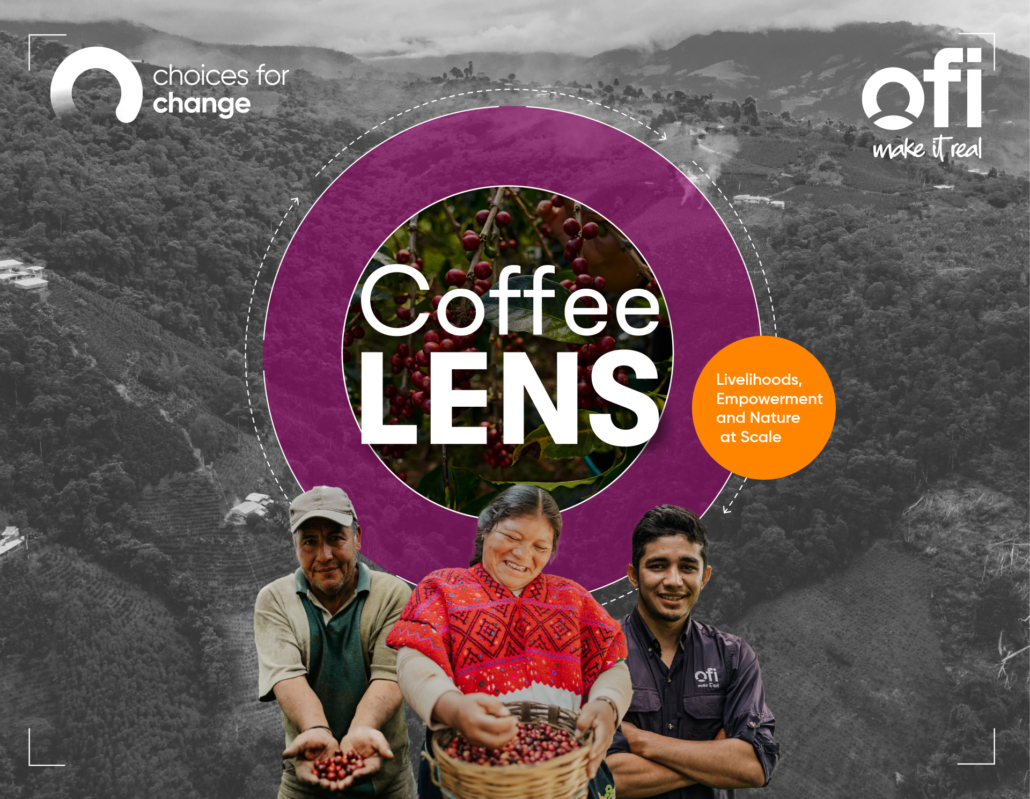ofi reports progress on 2030 coffee sustainability targets with focus on climate action and farmer livelihoods
ofi has published its Coffee LENS 2024 Impact Report, detailing progress towards 2030 sustainability targets across its global coffee operations. The report documents advances in climate action, farmer support programmes, and supply chain traceability during a year marked by significant market volatility and climate challenges.
The report shows that 98,560 farmer households received livelihood support in 2024, whilst 20,199 coffee farmer households achieved living income status – exceeding the company’s 2030 target of 20,000 households. However, ofi notes this figure represents a strategic recalibration from 115,800 households reached in 2023, as resources were redirected towards building more robust data systems and traceability infrastructure to meet evolving regulatory requirements, including the EU Deforestation Regulation (EUDR).
Digital tools drive emission reductions
A key development highlighted in the report is the deployment of ofi’s Digital Footprint Calculator (DFC), which has generated 54 greenhouse gas footprints for coffee supply chains. The tool, built into ofi’s AtSource sustainable sourcing solution and certified by The Carbon Trust, enables customers to access detailed environmental data for their coffee purchases.
“Our digital tools are helping us refine our approach and deliver targeted interventions,” said Vivek Verma, CEO of ofi’s coffee business. “However, real climate action happens when the world’s 12 million coffee smallholders have the means to adopt and apply more sustainable practices on the ground. It requires systemic investment in farmer resilience and income security to empower them as agents of change.”
The report documents substantial emission reductions in key origins. In Brazil and Peru, targeted strategies led by ofi’s local teams resulted in 19% and 30% drops in on-farm emissions respectively in 2024, compared to 2021 baselines. These reductions were primarily achieved through improved fertiliser efficiency, enhanced canopy density via pruning, and integrated weed management to minimise herbicide use. In Vietnam’s robusta-producing Lam Dong, Gia Lai, and Dak Nong provinces, a baseline study using the DFC tool determined emissions of 2.6 tCO₂eq/tonne Green Bean Equivalent. With fertiliser production and crop residues identified as major contri-butors, ofi trained 1,300 farmers on climatesmart practices including precision input management, pruning, and Good Agricultural Practices. Monitoring indicates these interventions are on track to achieve a 39% average reduction in emissions by 2028.
In Guatemala, ofi launched two regenerative agriculture projects focusing on forced and non-forced aeration composting, biogas production, wastewater management, and water-saving technologies. The initiative includes installation of 10 Ecoline 800 systems across wet mills to enhance water efficiency.
Progress on scope 1 and 2 emissions
ofi reported a 28% reduction in absolute Scope 1 and 2 GHG emissions against its 2020 baseline, excluding soluble coffee processing facilities. The company submitted Science Based Targets initiative (SBTi) targets in 2024, which were validated in 2025. Reporting against the 2020 baseline of 6.7 million tCO₂eq Scope 3 FLAG (Forest, Land and Agriculture) emissions will commence in 2026.
Enhanced traceability and market access
The report documents significant advances in supply chain transparency. Over 40,000 additional farmers were registered to ofi’s direct sourcing network via its Olam Farmer Information System (OFIS), bringing the total to 224,600. The company conducted deforestation assessments on 176,000+ coffee plots as part of remediation actions.
“Expanding these on-the-ground connections gives us unprecedented transparency into the first mile of the supply chain,” Verma noted. “This allows us to meet more farmers’ precise needs and support customers’ requirements with sustainable, traceable products.”
In Brazil, ofi’s Direct app now connects approximately 22,000 farmers directly with buyers, enabling real-time transactions and market access. Since launching in 2020, the platform has facilitated transparent pricing based on farm location, sample quality, and sustainability programme participation.
Social impact and farmer support
The report details delivery of enhanced livelihood support to farmers across 55 sustainability programmes implemented with customers and partners in 17 origins. Support included agronomy training, access to inputs, and infrastructure improvements.
A social capital impact valuation conducted on a four-year living income project in Honduras, delivered in partner-ship with ALDI SOUTH Group, indicated that for every dollar invested over the programme period, five dollars’ worth of social value was achieved through improved productivity, market access, and certification standards amongst approximately 1,000 farmers.
Community support expanded significantly, with 12,280 children benefiting from educational support and infrastructure – more than double the 5,500 reached in 2023. Health and nutrition interventions reached 31,600 community households, up from 19,000 in 2023.
The report shows 23,570 women farmers received livelihood support, progressing towards the 2030 target of 60,000. Youth vocational support reached 2,705 individuals.
Regenerative agriculture expansion
ofi reported 165,000 hectares under regenerative agricultural practices in 2024, nearly double the 84,000 hectares in 2023. The company distributed 310,500 non-coffee trees including species such as Gmelina, Ibiza, Laurel, and Cedar, bringing cumulative distribution since 2020 to over 3.1 million trees.
Water efficiency improvements in wet mills resulted in 137,900m³ saved in 2024, with cumulative savings of 438,000m³ since 2020.
“This report comes after another year marked by persistent volatility, geopolitical complexities, and the undeniable acceleration of climate impacts,” Verma stated. “Yet, these challenges are strong motivation for continued engagement and action, focused on resilience and responsibility.”
For more information, visit: https://shorturl.at/iPOVi



